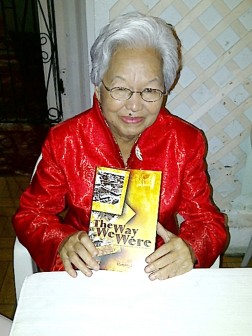Well-known caterer and historian of the Chinese movement in Guyana, Margery Kirkpatrick, yesterday launched her second book, which is an autobiographical account of growing up in British Guiana.
The book, The Way We Were – Memories of a childhood in British Guiana, was officially launched last evening at Kirkpatrick’s home at Meadowbrook Gardens, Georgetown. It is described as a chronicle of the Chinese experience in the then colony, through the eyes of Kirkpatrick, a third-generation Chinese girl growing up in the mixed society of the 1940s.
“I was motivated to write this book for a number of reasons but foremost is that when I look around and see what is happening to our youth and breakdown of the moral fibre, I wanted to show them, to give them something that they can look to and say this is how it was and this is how it could be… how the then society, as a whole, played a role in helping each other, without a care of race, class or wealth and acted like a big family,” Kirkpatrick said.
For this reason, she hopes the book would be read in schools in History, Social Studies or English Literature classes. She said, “It’s the young people who have to be moulded and it’s them who need something good to emulate.”
Kirkpatrick also said the book can be used to motivate men in the society by showing them that they do not have to solely chase after money to be good husbands, fathers and male role models and to contribute productively. She cited her father, a Chinese immigrant farmer with eight children, who brought happiness to his family equal to that of the wealthiest in their Robb Street neighbourhood.

“Guyanese men of today are frustrated because they are accustomed to being the provider and head of the home. However, we have become a money-driven society, so that the focus now is to chase after the dollar continuously, thinking that’s the only way to please their loved ones. And when they fail, they become frustrated and lash out at the ones closest to them, abusing them but still hurting,” she said. “This book shows a man with meagre earnings who provided for a wife and eight children and was still fun-loving, still took the time to do the little things that matter before he died at the early age of 40,” she added.
Further, Kirkpatrick said the aftermath of her father’s death depicts a Guyanese society that took on a role of assisting in the care of her mother and both her and her siblings. She said, while smiling fondly, “Society was family. I illustrate this, for example, when my father died and the shopkeeper sold us mixed sweets for four cents instead of the eight that was the regular price. Or when the community came together to help my mother through various ways, where everyone was uncle or aunt, paying no mind for race… where those who had a little more, gave to those who had a little less.”
Told in a series of short stories, the book also includes a layout of pre-independence-era Robb Street, including the names of the residents on each home to create in the minds of the reader a vivid picture.
The book is being sold at Austin’s Book Services.





